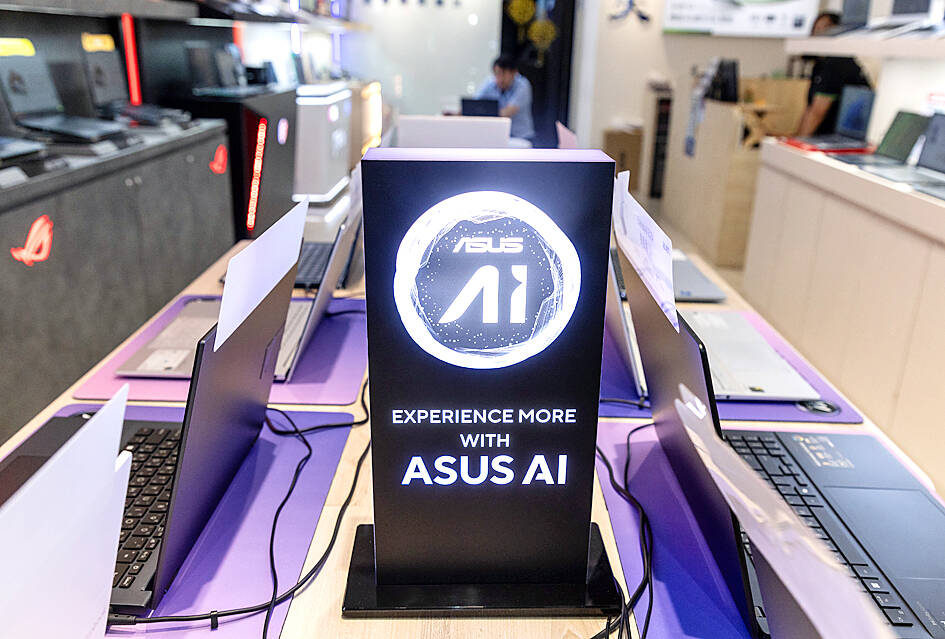The government’s business climate monitor turned “red” for December last year, suggesting an economic boom after a three-month hiatus, attributable to strong demand for electronics used in developing artificial intelligence (AI), the National Development Council (NDC) said yesterday.
The composite score rose 4 points from November last year to 38, helped by the high sales season for technology products and frontloading demand ahead of the Lunar New Year holiday, NDC Economic Department Director Chiu Chiu-ying (邱秋瑩) told a media briefing, adding that pickups in the industrial output, manufacturing sales and business confidence readings contributed to the gain.
The council uses a five-color system to depict the nation’s economic state, with “red” indicating a boom, “green” suggesting steady growth and “blue” signaling a recession. Dual colors of “yellow-red” and “yellow-blue” indicate that the economy is changing gears.

Photo: CNA
Taiwan is home to the world’s major suppliers of AI chips, servers, memory, storage and other electronic components.
Domestically, retailers and restaurants reported resilient business in line with Lunar New Year celebrations, the council said.
The index of leading indicators, which seeks to project the economic scenes in the subsequent six months, shrank 0.76 percent to 100.43, with most components — including stock prices, new construction floor space, exports outlook and money supply — losing momentum, the council said.
The readings for labor accession and imports of semiconductor equipment displayed positive cyclical movements, it added.
AI-related sectors might be overheating, warranting careful monitoring, Chiu said, adding that US President Donald Trump’s trade policy is adding to the uncertainty.
Trump has threatened to impose tariffs on semiconductors, which would be unfavorable for Taiwan’s chipmakers.
The index of coincident indicators increased 0.61 percent to 105.2 thanks to favorable cyclical movements in industrial production, imports of capital equipment, exports and overtime hours, the council said.
The advances more than offset retreats in the measures of electricity usage, as well as wholesale, retail and restaurant revenues, it said.
The council said it is confident that Taiwan’s economy would grow by more than 3 percent this year, on top of a 4.3 percent increase last year.
Chiu declined to comment on whether the “red” signal would continue, saying that “red” and “yellow-red” signals both indicate economic health.
Global trade is to rise this year, while major US technology giants have reaffirmed commitment to AI investments, a trend that would benefit local firms on the AI supply chain, she said.
Furthermore, companies at home and abroad would step up spending on low carbon migration, which would help boost private investment, she added.

UNCERTAINTY: Innolux activated a stringent supply chain management mechanism, as it did during the COVID-19 pandemic, to ensure optimal inventory levels for customers Flat-panel display makers AUO Corp (友達) and Innolux Corp (群創) yesterday said that about 12 to 20 percent of their display business is at risk of potential US tariffs and that they would relocate production or shipment destinations to mitigate the levies’ effects. US tariffs would have a direct impact of US$200 million on AUO’s revenue, company chairman Paul Peng (彭雙浪) told reporters on the sidelines of the Touch Taiwan trade show in Taipei yesterday. That would make up about 12 percent of the company’s overall revenue. To cope with the tariff uncertainty, AUO plans to allocate its production to manufacturing facilities in

TAKING STOCK: A Taiwanese cookware firm in Vietnam urged customers to assess inventory or place orders early so shipments can reach the US while tariffs are paused Taiwanese businesses in Vietnam are exploring alternatives after the White House imposed a 46 percent import duty on Vietnamese goods, following US President Donald Trump’s announcement of “reciprocal” tariffs on the US’ trading partners. Lo Shih-liang (羅世良), chairman of Brico Industry Co (裕茂工業), a Taiwanese company that manufactures cast iron cookware and stove components in Vietnam, said that more than 40 percent of his business was tied to the US market, describing the constant US policy shifts as an emotional roller coaster. “I work during the day and stay up all night watching the news. I’ve been following US news until 3am

COLLABORATION: Given Taiwan’s key position in global supply chains, the US firm is discussing strategies with local partners and clients to deal with global uncertainties Advanced Micro Devices Inc (AMD) yesterday said it is meeting with local ecosystem partners, including Taiwan Semiconductor Manufacturing Co (TSMC, 台積電), to discuss strategies, including long-term manufacturing, to navigate uncertainties such as US tariffs, as Taiwan occupies an important position in global supply chains. AMD chief executive officer Lisa Su (蘇姿丰) told reporters that Taiwan is an important part of the chip designer’s ecosystem and she is discussing with partners and customers in Taiwan to forge strong collaborations on different areas during this critical period. AMD has just become the first artificial-intelligence (AI) server chip customer of TSMC to utilize its advanced

Six years ago, LVMH’s billionaire CEO Bernard Arnault and US President Donald Trump cut the blue ribbon on a factory in rural Texas that would make designer handbags for Louis Vuitton, one of the world’s best-known luxury brands. However, since the high-profile opening, the factory has faced a host of problems limiting production, 11 former Louis Vuitton employees said. The site has consistently ranked among the worst-performing for Louis Vuitton globally, “significantly” underperforming other facilities, said three former Louis Vuitton workers and a senior industry source, who cited internal rankings shared with staff. The plant’s problems — which have not